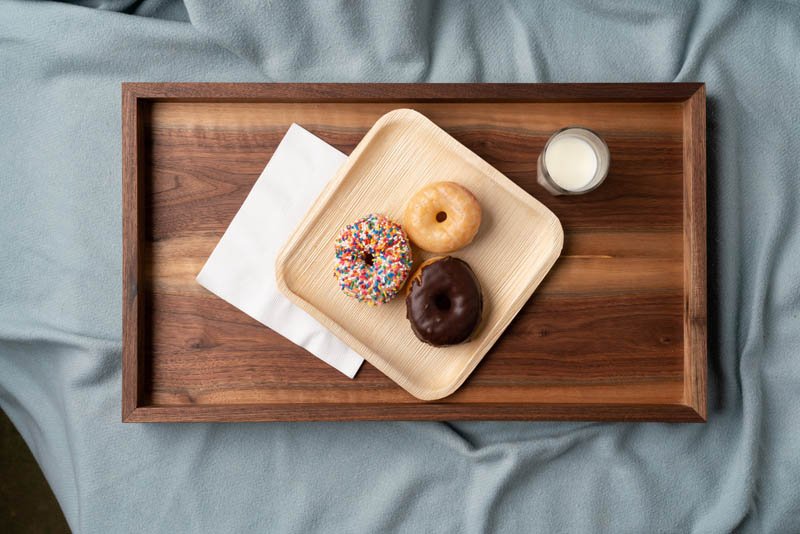Biodegradable vs. Compostable...What Do They Mean & What's The Difference?
This is part of an ongoing series by goldune, (they sell our products) called DTL (that stands for Down to Learn)—deep dives into the odd, nuanced and mysterious world of sustainability.
As more and more of us turn towards conscious consumerism by voting with our dollars for products produced responsibly, brands have begun upping their game. And while we love to see it, we’re also wary of alllllllll the terms splashed onto packaging, which can run the risk of “greenwashing,” or conveying a false (or misleading) impression of environmental practices.
Below, we dive into one of the most common and misunderstood phrases out there: biodegradable. Continue reading for more on what *exactly* it means, plus how it stacks up against compostable.
Biodegradable 101
At its most basic level, “biodegradable” refers to the ability to break down and return to nature with the help of bacteria, fungi, algae, and other biological processes. It’s often seen on products packaged in plant-based plastic, such as soaps and shampoos, as well as corrugated cardboard or any sort of mineral-based material. The speed at which a biodegradable product breaks down into its component parts varies depending on the composition of the original material, as well as the degree to which it was processed.
The difference between “biodegradable” and “compostable”
Anything that’s compostable is also biodegradable, but not everything that’s biodegradable is compostable. Here’s why:
-
Biodegradable products aren’t always organic
Sure, compostable items like fruits and veggies fall under the biodegradable umbrella, but so do non-compostable, non-organic items like certain plastics.
-
Biodegradable products don’t produce the same added benefits as compostable products
When organic material is composted, it breaks down into a soil-like substance called humus that can be used as fertilizer to improve soil health. Certain biodegradable products, on the other hand, may leave behind metal residue.
-
Biodegradable products are designed to break down in landfills
And depending on how long it takes the product to biodegrade (upwards of one year, in some cases), there could be the risk of greenhouse gas emissions over time. Compostable materials, however, take an average of 90 days to break down under specific expediting factors such as sunlight, drainage, moisture, wind, temperature, and microorganisms.
So what’s the verdict on biodegradable?
As of 2017, just 9% of plastic was being recycled, with 12% incinerated and the remaining 79% ending up in landfills. What’s more, according to a study published in Scientific American, around eight million metric tons of plastic end up in oceans every year. All of this is to say that...TL;DR...biodegradable isn’t always bad since it helps reduce the buildup of waste in landfills and bodies of water. However, at face value, the term doesn’t say much since we don’t know how long the product in question takes to biodegrade. If we’re talkin’ years, then it’s not much different from regular plastic which, if given enough time, would break down anyway.
There are lots more nuances here than meet the eye. Sometimes "compostable" bowls at take out chain are made with a chemical called PFAS, which is detrimental to people and planet. Just because something can break down into organic matter and feed our soils is not necessarily a good thing, and PFAS is a great example. It's pretty hard to screen products or packaging to know *exactly* what goes into every piece, but there are some things we consider pretty safe, if even not compostable-- corrugated paperboard or cardboard is a good example of packaging that's not technically "compostable," but also is unlikely to contain harmful chemicals and can be recycled relatively efficiently. At Goldune, our tiny team is doing all the homework we can to get literate on what the best materials are, for you and for the environment, and to get smart about vetting better, so we can say with confidence that we're PFAS free.
Either way, when possible, we opt to ditch the plastic altogether. We do the extra homework so we can tell you when a product is plastic-free (on each product page!) and you can always search by criteria or value when you're shopping Goldune-- a simple "compostable" or "plastic-free" search will yield all of our options that we've vetted and can totally confirm are what they say they are!
Sources:
https://www.scientificamerican.com/article/covid-19-has-worsened-the-ocean-plastic-pollution-problem/
https://www.epa.gov/pfas/basic-information-pfas
https://sn.astm.org/?q=features/standards-biodegradable-plastics-ma19.html



